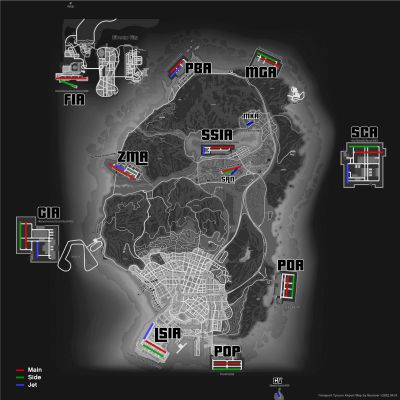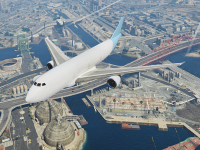Cargo Pilot
Cargo pilot![]() is one of the jobs (and skills) available in Transport Tycoon. As a cargo pilot you will transport cargo with airplanes between various airports using Air Traffic Control (ATC). You will have to start off with a small airplane and gradually work your way up to take control of huge airliners. Like any tiered job, your pay will depend heavily on your progress within the skill.
is one of the jobs (and skills) available in Transport Tycoon. As a cargo pilot you will transport cargo with airplanes between various airports using Air Traffic Control (ATC). You will have to start off with a small airplane and gradually work your way up to take control of huge airliners. Like any tiered job, your pay will depend heavily on your progress within the skill.
Contents
Getting Started
Airplanes are expensive, so consider doing another job first such as Garbage Collector or take a Loan. Cargo will eventually deplete in high-demand areas, meaning that longer routes are more sustainable. Delivering and Taking cargo depletes stocks. If airports are not loading while flying then enable Settings → Advanced Graphics → High Detail Streaming While Flying.
- Visit any Job Center
 (except for Life Invader) or have the appropriate job card and change your job to Cargo Pilot.
(except for Life Invader) or have the appropriate job card and change your job to Cargo Pilot. - To buy your first plane, you will need to visit the Aircraft Dealership
 , located on the north-western side of the airport behind the Los Santos Customs
, located on the north-western side of the airport behind the Los Santos Customs  (You MUST use a cargo-specific aircraft for this job, no exceptions. You will also be required to have Strength level 8 to carry the cargo).
(You MUST use a cargo-specific aircraft for this job, no exceptions. You will also be required to have Strength level 8 to carry the cargo). - Once you have bought your plane you will need to taxi to a yellow crate
 , a menu on the right side of the screen should pop up, if not, try to position yourself differently, so that the plane icon overlaps the crate icon on your minimap.
, a menu on the right side of the screen should pop up, if not, try to position yourself differently, so that the plane icon overlaps the crate icon on your minimap. - Purchase some cargo of your choice (Based on levels & stocks), It will display the airport it can be taken to, these airports will give you the reward.
- Make sure to also fill up the Trunk of the cargo plane you are using!
- Unlike Airline piloting, your destination is not shown on your minimap, so if you don't know where the airport you're flying to is located, be sure to open your map before takeoff and mark it by double-clicking on the yellow crate
 at the destination airport. A map of all airports can be seen below.
at the destination airport. A map of all airports can be seen below. - Once you have delivered the Cargo, you will be rewarded with money and EXP.
Job Bonuses
For the Cargo Pilot job, correct usage of the Air Traffic Control system will reward the player with extra Experience on correct takeoffs and landings. Incorrect usage will result in a Runway Utilization Detection System (RUDS) violation. This applies a temporary 15 minute penalty resulting in only being able to choose the x1 pickup and delivery options.
Air Traffic Control (ATC)
ATC on takeoff 
Press the TAB key while in an airplane to open up the ATC menu with a list of airports. The closest airport will be marked with a green ribbon. Check if the JET runway (if available at your airport) is clear (yellow color on map), and then request takeoff before entering the runway. If you are unsure which runway is which, refer to the airport runway map on this page. Double-check if the runway has changed to a green color. If it has, you will have a few seconds to initiate takeoff on the runway. You can take off in both directions of a runway, but not sideways. If no runway is available for takeoff, you must wait for one to become available. On rare occasions the ATC system may give green light for two airplanes to takeoff at the same time.
ATC on landing 
ATC on landing is a very similar concept to takeoff. When you approach your destination airport, think of which runway best suits you. Consider your current bearing, airplane, and distance. As you start off with a small airplane, you should select the JET runway if available at your destination airport. If the runway has changed green, you have a few seconds to land your plane on the runway in both directions of a runway, but not sideways. If no runway is available, you must circle your airplane in the air until one becomes available. On rare occasions the ATC system may give green light to two airplanes to land at the same time.
Airports
You can refer to the following map for an overview of all airports with their identification codes and MAIN, SIDE and JET runways.
Airplanes
Below are the requirements and costs of all available Cargo Aircraft.
| Name | Price | Level Requirement | Weight Capacity |
|---|---|---|---|
| $60,000 | Cargo Piloting Level 1 | 200kg | |
| $250,000 | Cargo Piloting Level 5 | 500kg | |
| $1,500,000 | Cargo Piloting Level 25 | 1500kg | |
| $19,000,000 | Cargo Piloting Level 55 Airline Pilot Level 30 |
3000kg |
Milestones
| Unlock | Cargo Pilot Level requirement |
|---|---|
| You can now use the Mammatus | 1 |
| You can now collect cargo at LSIA | 1 |
| You can now do aerial PostOP deliveries | 5 |
| You can now use the Cuban 800 | 5 |
| You can now move cargo from PostOP to San Chianski | 5 |
| You can now move cargo from LSIA to San Chianski | 10 |
| You can now move cargo from SSIA to Mt. Gordo | 15 |
| You can now move cargo from Chumash Island to Pacific Ocean | 20 |
| You can now move cargo from Mt. Gordo to Paleto Bay | 25 |
| You can now use the Titan | 25 |
| You can now move cargo from San Chianski to SSIA | 30 |
| You can now process 2 crates of cargo at once | 30 |
| You can now move cargo from Paleto Bay to Zancudo | 35 |
| You can now move cargo from Zancudo to LSIA | 40 |
| You can now move cargo from SSIA to Chumash Island | 40 |
| You can now move cargo from Pacific Ocean to LSIA | 45 |
| You can now move cargo from San Chianski to Pacific Ocean | 50 |
| You can now use the W-575F (Also needs Airline Pilot Level 30) |
55 |
| You can now move cargo from PostOP to SSIA | 60 |
| You can now move cargo from Chumash Island to San Chianski | 60 |
| You can now move cargo from Pacific Ocean to Zanduco | 70 |
| You can now process 4 crates of cargo at once | 70 |
| You can now move cargo from Zancudo to Mt. Gordo | 90 |
Air Cargo (Destination) List
| From | To | Cargo Level |
|---|---|---|
| Los Santos International Airport (LSIA) | Chumash International Airport (CIA) | 1 |
| San Chianski Airport (SCA) | 10 | |
| PostOp Airport | Pacific Ocean Airport (POA) | 1 |
| San Chianski Airport (SCA) | 5 | |
| Sandy Shores International Airport (SSIA) | 60 | |
| Pacific Ocean Airport (POA) | Mount Gordo Airport (MGA) | 1 |
| Los Santos International Airport (LSIA) | 45 | |
| Fort Zancudo (ZAN) | 70 | |
| San Chianski Airport (SCA) | Paleto Bay Airport (PBA) | 1 |
| Sandy Shores International Airport (SSIA) | 30 | |
| Pacific Ocean Airport (POA) | 50 | |
| Mount Gordo Airport (MGA) | San Chianski Airport (SCA) | 1 |
| Paleto Bay Airport (PBA) | 25 | |
| Paleto Bay Airport (PBA) | Sandy Shores International Airport (SSIA) | 1 |
| Fort Zancudo (ZAN) | 35 | |
| Sandy Shores International Airport (SSIA) | Los Santos International Airport (LSIA) | 1 |
| Mount Gordo Airport (MGA) | 15 | |
| Chumash International Airport (CIA) | 40 | |
| Fort Zancudo (ZAN) | PostOp Airport | 1 |
| Los Santos International Airport (LSIA) | 40 | |
| Mount Gordo Airport (MGA) | 90 | |
| Chumash International Airport (CIA) | PostOp Airport | 1 |
| Fort Zancudo (ZAN) | 1 | |
| Pacific Ocean Airport (POA) | 20 | |
| San Chianski Airport (SCA) | 60 |











